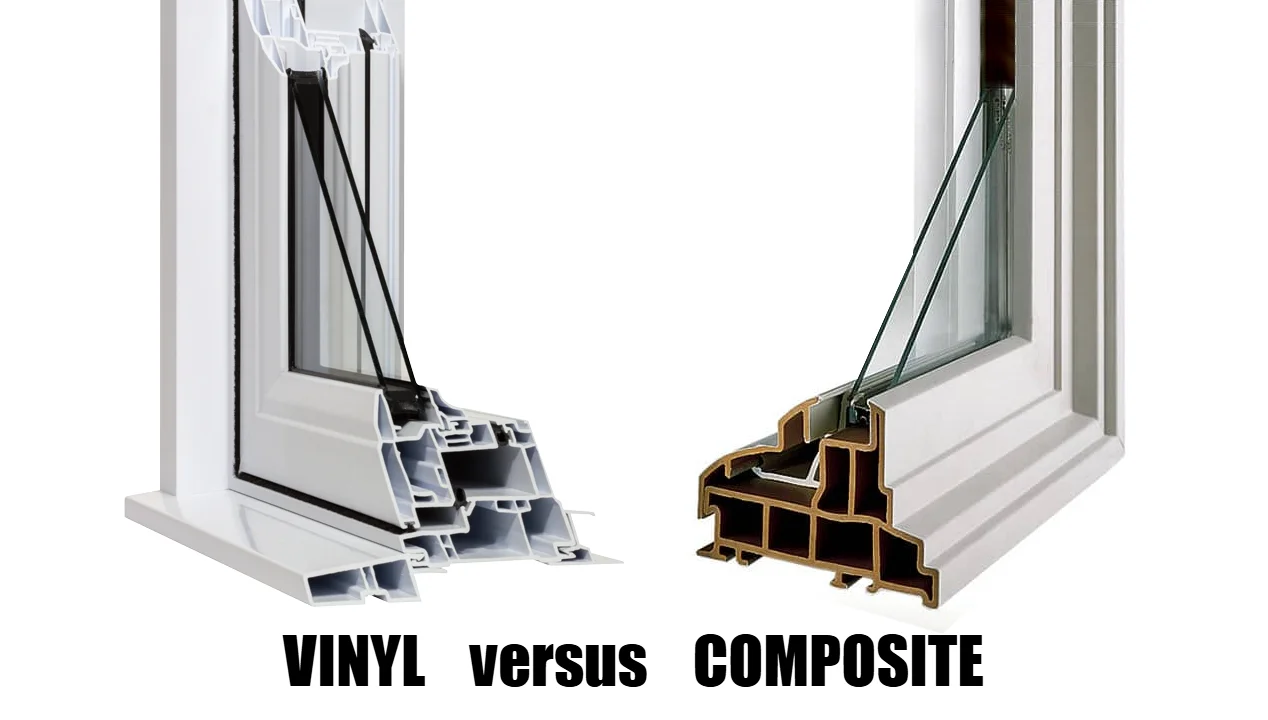Energy Efficiency and Durability of Vinyl and Composite Windows.
Vinyl Vs. Composite Windows
Why Vinyl is the Superior Choice for Replacement Windows
When it comes to replacing your windows, one of the most important decisions you’ll make is choosing the right material. Vinyl and composite materials are both popular options, each offering unique benefits. However, vinyl windows have distinct advantages that often make them the preferred choice for homeowners. Here’s a breakdown of the key benefits of vinyl windows over composite windows, so you can make an informed decision for your home.
1. Cost-Effectiveness
Vinyl windows are generally more affordable than composite windows, making them an attractive option for budget-conscious homeowners. Vinyl’s lower cost doesn’t mean sacrificing quality, as it remains highly durable and energy-efficient. By choosing vinyl over composite, you can save money upfront while still getting a product that performs well over time.
2. Energy Efficiency
One of the most significant benefits of vinyl windows is their excellent energy efficiency. Vinyl is a natural insulator, which helps reduce heat transfer and keeps your home’s interior comfortable year-round. Many vinyl windows also feature multi-chambered frames and fusion-welded corners, which enhance insulation and reduce drafts.
Composite windows can also be energy-efficient, but vinyl windows often come out on top due to their material properties. They typically have a lower thermal conductivity than composite materials, helping you save on energy bills by reducing heating and cooling costs.
3. Low Maintenance Requirements
Vinyl windows are known for their low maintenance needs. Unlike composite windows, vinyl windows do not require painting or staining, as the color is embedded throughout the material. Vinyl is also resistant to chipping, peeling, and fading, so your windows will continue to look great with minimal upkeep.
Composite windows, on the other hand, may require occasional painting to maintain their appearance. Over time, they can be susceptible to fading, especially in areas with strong sun exposure. With vinyl, a simple cleaning with soap and water is typically all that’s needed to keep your windows looking new.
4. Durability and Weather Resistance
Vinyl is a highly durable material that can withstand various weather conditions without warping, cracking, or expanding. It resists moisture and won’t rot, even in humid or rainy climates. This makes vinyl windows an excellent choice for homeowners in regions with extreme weather.
Composite windows, while also durable, can be more susceptible to moisture and may not hold up as well as vinyl in consistently wet or humid environments. Vinyl windows are designed to last and perform well over time, providing peace of mind that your investment will withstand the elements.
5. Versatility and Style Options
Vinyl windows are available in a wide range of colors and styles, allowing you to customize the look to match your home’s aesthetics. Many manufacturers offer various grid patterns, window shapes, and frame styles, so you can find vinyl windows that complement both traditional and modern designs.
Composite windows do offer some design flexibility, but they typically have fewer color options, especially when compared to vinyl. Additionally, because vinyl windows do not require painting, you won’t need to worry about matching paint colors or dealing with touch-ups over time.
6. Enhanced Noise Reduction
Vinyl windows, especially double or triple-pane models, can provide excellent noise reduction benefits. The vinyl material combined with insulated glass can help block out external sounds, creating a quieter and more peaceful indoor environment.
While composite windows can also offer noise reduction, vinyl’s material composition often leads to superior soundproofing qualities. This can be especially beneficial for homes in busy areas or near main roads.
7. Environmentally Friendly Options
Many homeowners today are concerned about sustainability, and vinyl windows can be an eco-friendly choice. Vinyl is recyclable, and some manufacturers use recycled materials in their production process, reducing environmental impact. Additionally, because vinyl windows improve energy efficiency, they contribute to a smaller carbon footprint by reducing the energy needed to heat and cool your home.
Composite materials are often made with a combination of different materials, which can make recycling more challenging. Choosing vinyl can therefore be a more sustainable option over the long term.
Final Thoughts
Vinyl windows provide homeowners with a cost-effective, low-maintenance, and energy-efficient solution for window replacement. Their durability, weather resistance, and customizable options make them an excellent choice for virtually any home style or climate.
While composite windows have their benefits, vinyl windows often outperform them in key areas, making vinyl the superior choice for many homeowners. If you’re considering new windows for your home, vinyl offers a fantastic blend of affordability, performance, and longevity.
Ready to explore your vinyl window options? Contact us today for a consultation, and let us help you find the perfect windows for your home!

